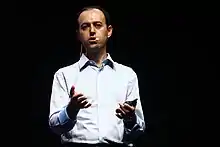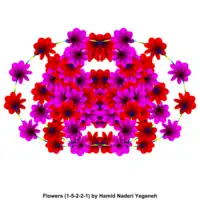Caucher Birkar
Caucher Birkar FRS (Kurdish: کۆچەر بیرکار, romanized: Koçer Bîrkar, lit. 'migrant mathematician'; born Fereydoun Derakhshani (Persian: فریدون درخشانی); July 1978) is an Iranian Kurdish mathematician and a professor at Tsinghua University[4] and at the University of Cambridge.[3][5]
Caucher Birkar کۆچەر بیرکار | |
|---|---|
 | |
| Born | 1978 (age 44–45) Marivan County, Iran |
| Citizenship | Iran, Britain – dual citizenship |
| Alma mater | University of Tehran (BSc) University of Nottingham (PhD) |
| Children | 1 |
| Awards | Leverhulme Prize (2010) Moore Prize (2016) Fields Medal (2018) |
| Scientific career | |
| Fields | |
| Institutions | Tsinghua University University of Cambridge |
| Thesis | Topics in Modern Algebraic Geometry (2004) |
| Doctoral advisor | |
| Website | www |
Birkar is an important contributor to modern birational geometry.[6] In 2010 he received the Leverhulme Prize in mathematics and statistics for his contributions to algebraic geometry,[7] and in 2016, shared the AMS Moore Prize for the article "Existence of minimal models for varieties of log general type".[8] He was awarded the Fields Medal in 2018, "for his proof of boundedness of Fano varieties and contributions to the minimal model program".[9] In his office at the University, Birkar has two photographs of Alexander Grothendieck, his favorite mathematician, who like Birkar, was a refugee and Fields medalist.[10]
Early life and education
Birkar is a Kurd, born in 1978 in Marivan County, Kurdistan province, Iran, on a subsistence farm, and raised during the Iran-Iraq War.[10] He had five siblings,[10] and learned a lot of mathematics from his brothers during the first years of school.[11][10] Following his graduation from high school,[10] Birkar studied mathematics at the University of Tehran where he received his bachelor's degree. He was awarded the third prize in the International Mathematics Competition for University Students in 2000[12] and, shortly after, while still studying in the University, relocated to the UK as a refugee and asked for political asylum.[13] In 2001–2004 Birkar was a PhD student at the University of Nottingham.[14] In 2003 he was awarded the Cecil King Travel Scholarship by the London Mathematical Society as the most promising PhD student.[15] Upon emigrating to the UK he changed his name to Caucher Birkar, which means "migrant mathematician" in Kurdish.[16]
Research and career
Together with Paolo Cascini, Christopher Hacon and James McKernan, Birkar settled several conjectures including existence of log flips, finite generation of log canonical rings, and existence of minimal models for varieties of log general type, building upon earlier work of Vyacheslav Shokurov and of Hacon and McKernan.[17]
In the setting of log canonical singularities, he proved existence of log flips along with key cases of the minimal model and abundance conjectures. (This was also proved independently by Hacon and Chenyang Xu.)[18]
In a different direction, he studied the old problem of Iitaka on effectivity of Iitaka fibrations induced by pluri-canonical systems on varieties of non-negative Kodaira dimension. The problem consists of two halves: one related to general fibres of the fibration and one related to the base of the fibration. Birkar and Zhang co-solved the second half of the problem, hence essentially reducing Iitaka's problem to the special case of Kodaira dimension zero.[19]
In more recent work, Birkar studied Fano varieties and singularities of linear systems. He has solved several fundamental problems such as Shokurov's conjecture on boundedness of complements, and the Borisov–Alexeev–Borisov conjecture on boundedness of Fano varieties.[20][21] In 2018, Birkar was given the Fields Medal for his work on Fano varieties and other contributions to the minimal model problem.[9] In a video made available by the Simons Foundation, Birkar expressed hope that his Fields Medal will put "just a little smile on the lips" of the world's estimated 40 million Kurds.[22] Birkar's Fields Medal was stolen on the same day it was awarded to him.[23] In a special ceremony at ICM 2018, Birkar was presented with a replacement medal, leading to quips he was the first person to receive the Fields Medal twice.[24]
Birkar is also active in the field of birational geometry over fields of positive characteristic. His work together with work of Hacon-Xu nearly completes the minimal model program for 3-folds over fields of characteristic at least 7.[25]
Awards and honours
- 2010 Leverhulme Prize in mathematics and statistics for "his outstanding contributions to fundamental research in algebraic geometry"[7][26]
- 2010 Prize of the Fondation Sciences Mathématiques de Paris[27]
- 2016 AMS Moore Prize[28]
- 2018 Fields Medal[9]
- 2019 Honorary Doctorate of the Salahaddin University, Erbil[29]
References
- "جایزه معادل "نوبل ریاضی" به یک کرد ایرانی پناهنده به بریتانیا رسید". VoA (in Persian). 1 August 2018.
- "چرا مریم میرزاخانی و کوچر بیرکار مهاجرت کردند؟". BBC (in Persian). 3 August 2018.
- Caucher Birkar at the Mathematics Genealogy Project
- "清华大学举行菲尔兹奖获得者考切尔•比尔卡尔教授聘任仪式" (in Chinese (China)). 清华新闻网.
- Caucher Birkar publications indexed by the Scopus bibliographic database. (subscription required)
- "Birkar Citation" (PDF). International Mathematical Union. Birkar long citation. International Mathematical Union. 2018. p. 2.
{{cite web}}: CS1 maint: others (link) - "Philip Leverhulme Prizes". Archived from the original on 10 June 2013. Retrieved 30 December 2012.
- "American Mathematical Society". www.ams.org. Retrieved 1 August 2018.
- Davis, Nicola; Zhou, Naaman (1 August 2018). "Former refugee among winners of Fields medal – the 'Nobel prize for maths'". The Guardian. Retrieved 3 January 2021.
- Hartnett, Kevin (1 August 2018). "An Innovator Who Brings Order to an Infinitude of Equations". Quanta Magazine. Retrieved 3 January 2021.
- "Professor Caucher Birkar wins 2018 Fields Medal | Features: Faculty Insights". Cambridge University. Archived from the original on 13 October 2018. Retrieved 2 January 2022.
- Draganova, C. "IMC – International Mathematics Competition for University Students". www.ucl.ac.uk. Retrieved 2 August 2018.
- Fields medal: UK refugee wins 'biggest maths prize', by Paul Rincon, at BBC.co.uk; published 1 August 2018; retrieved 1 August 2018
- Birkar, Caucher (2004). Topics in modern algebraic geometry (PDF). cam.ac.uk (PhD thesis). University of Nottingham. EThOS uk.bl.ethos.421475.
- "Cecil King Travel Scholarship in Mathematics". Retrieved 3 August 2018.
- لندن, کیهان (2 August 2018). "مدال "فیلدز" کوچر بیرکار ریاضیدان به سرقت رفت اما افتخارش برای ایرانیان ماندنی است" (in Persian). Retrieved 7 August 2018.
- C. Birkar, P. Cascini, C. Hacon, J. McKernan Existence of minimal models for varieties of log general type, J. Amer. Math. Soc. 23 (2010), 405–468.
- Birkar, Caucher (2012). "Existence of log canonical flips and a special LMMP". Publications Mathématiques de l'IHÉS. 115: 325–368. arXiv:1104.4981. doi:10.1007/s10240-012-0039-5. S2CID 121722661.
- C. Birkar, D.-Q. Zhang, Effectivity of Iitaka fibrations and pluricanonical systems of polarized pairs. To appear in Pub. Math IHES.
- C. Birkar, Anti-pluricanonical systems on Fano varieties. arXiv:1603.05765
- C. Birkar, Singularities of linear systems and boundedness of Fano varieties. arXiv:1609.05543.
- Castelvecchi, Davide (1 August 2018). "Number-theory prodigy among winners of most coveted prize in mathematics". Nature. 560 (7717): 152–153. Bibcode:2018Natur.560..152C. doi:10.1038/d41586-018-05864-w. PMID 30087472.
- Phillips, Dom (1 August 2018). "World's most prestigious maths medal is stolen alongside his wallet minutes after professor wins it". The Guardian.
- ""I'm more famous now than I would be", jokes Birkar", ICM 2018, 4 August 2018, archived from the original on 8 August 2020, retrieved 10 November 2018
- C. Birkar, Existence of flips and minimal models for 3-folds in char p. Archived 9 August 2018 at the Wayback Machine Annales scientifiques de l'ENS 49 (2016), 169–212.
- "Caucher Birkar has been awarded 2010 Philip Leverhulme prize". wordpress.com. 22 November 2010. Retrieved 1 August 2018.
- "The Foundation's Prize Laureates". Archived from the original on 17 March 2014. Retrieved 1 June 2013.
- "American Mathematical Society". www.ams.org. Retrieved 2 August 2018.
- "University in Kurdistan awards honorary doctorate to Fields Medal laureate". Kurdistan24. Retrieved 31 July 2019.
Further reading
- Kevin Hartnett (1 August 2018), "An innovator who brings order to an infinitude of equations", Quanta Magazine.
